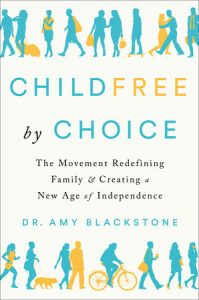 You’re selfish. You’ll die alone. You’re not a real woman. As a woman who has opted out of parenthood, I’ve heard it all. In my new book released today, CHILDFREE BY CHOICE, I set the record straight, analyzing data from my interviews with 70 childfree women and men, others’ work, and my own experience. I investigate the history and current growing movement of adults choosing not to have kids, considering what this cultural shift means for our society, economy, environment, perceived gender roles, and legacies.
You’re selfish. You’ll die alone. You’re not a real woman. As a woman who has opted out of parenthood, I’ve heard it all. In my new book released today, CHILDFREE BY CHOICE, I set the record straight, analyzing data from my interviews with 70 childfree women and men, others’ work, and my own experience. I investigate the history and current growing movement of adults choosing not to have kids, considering what this cultural shift means for our society, economy, environment, perceived gender roles, and legacies.
Today in the United States, one in six women will end her childbearing years without ever having given birth. Half of millennials don’t yet have children and it remains to be seen how many ever will. What at first glance appears to be the very personal question of whether to have kids has become a matter of public concern and political debate. We’ve seen the letters to advice columnists lamenting the pressure to give parents grandchildren, heard the cries of “You’ll regret it!” from well-meaning friends and relatives, and seen the name-calling (“Selfish!” “Stupid!” “Shallow!”) from observers online.
Despite the negative buzz surrounding them, 94 percent of childfree adults in my own study said they gave careful thought to their choice not to become parents. As Sarah, a childfree partnered psychiatrist in her 30s told me, “I actually think that most people who have children don’t even think about it, they just have them…most people just go for it and don’t give it much thought. Go for what’s next. ‘I got married, now I have to have kids.’ … I think there’s more thinking to decide to not have children.”
Further, while the stereotype tells us that all childfree people hate children, over a quarter of participants in my study chose careers – such as teaching, social work, and pediatrics – that involve work with children. As Susan, a childfree camp director in her 50s shared, “I had a lot of experience at being with children at various stages. And I enjoyed it, I loved it, but I said to myself, ‘There are way too many kids out there that don’t have someone to look after them and don’t have someone to be an advocate for them.’ And I felt that I could be that person.”
Other research shows that 80 percent of non-mothers play an active role in children’s lives. And when compared to parents, childfree people report higher marital satisfaction, lower rates of depression, and similar rates of civic engagement. In short, childfree people are happy, engaged singles and couples who have carved out meaningful lives for themselves. Understanding and supporting their choice means better outcomes for families, children, parents, and nonparents alike.
I explore these and other in my new book released today from Dutton.
Amy Blackstone is a professor in Sociology and the Margaret Chase Smith Policy Center at the University of Maine. She is author of Childfree by Choice: The Movement Redefining Family and Creating a New Age of Independence (Dutton, 2019). Amy and her husband Lance blog at we’re {not} having a baby!.

Comments 2
Becky — June 12, 2019
Thanks for the great article!
Popo — June 13, 2019
I'm a senior who had one unwanted child when single almost 50 years ago before Roe v Wade. After 5 decades I still wish my child had never been born. I never wanted to be a mother, and, believe me, you do NOT "change your mind" in time. In fact, many women who are conditioned to believe they'll want children, or are pressured into it by partner or family or friends, regret having them. Then they are trapped for at least 18 years. Then eventually their kids have kids and the cycle never ends due to all the different relatives involved...
Fortunately I was able to be sterilized before being stuck with a 2nd unwanted child. I only wish I had been able to have it done before the first.
Adoption? No, the only adoption agency I knew of then was Catholic, and I was not going to turn my child over to be brainwashed by a couple that supports pedophile priests and psychotic nuns.